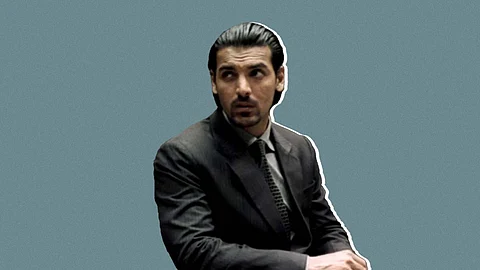
- Reviews
- Power List 2024
- Cannes 2024
- In-Depth Stories
- Web Stories
- News
- FC Lists
- Interviews
- Features
- FC SpecialsFC Specials

"To cure the soul by the means of the senses and to the cure the senses by the means of the soul", advised Lord Henry Wotton in Oscar Wilde's The Picture of Dorian Gray, itself a classic story of a vain, effete man's fall from grace when he tried to cure his soul by his senses and made a grotesque deal with the devil. In Anurag Kashyap's No Smoking, a very loose reworking of Stephen King's Quitters Inc, K, played by John Abraham, is one such vain and effete man who falls from grace when he tries to cure his senses and soul, both of which crave and yearn for the heady, sinful delight of a lit cigarette, from the stifling, omnipresent authority of those who wish him to give up the habit: an indomitable wife, a timid friend and ultimately a moustachioed guru.
In literature, we often, rather willingly, are led to sympathise with the sinners, the fallen angels, even such charming manifestations of satanic evil as Lord Wotton, that quick-witted charmer beloved of society, or Master James of Ballantrae; the same does not quite find itself into cinema - and so, back when Kashyap's film was released (on the same day as Imtiaz Ali's Jab We Met), one could have found audiences perturbed by its brave moral stance - of contending that sometimes curing the soul can be more debilitating than its opposite.
Girish Shahane's article in Time Out Mumbai compared the film favourably with A Clockwork Orange. In both the films, "the cure is worse than the disease if it robs you of your soul". This astute observation puts No Smoking in the proper realm of not merely Franz Kafka (to whom the film pays tribute by the name of its protagonist) but also a whole literature of nightmarish suspense - Dr. Jeykill and Mr. Hyde and even The Ministry Of Fear, stories of men haunted by their twin selves and even pursued by menacing and mysterious men with their sinister machinations. The film follows K on a breathless, nightmarish trail of disorientation and paranoia, haunted by ominous men in dark glasses like Tontons Macoute and finding himself in inexplicable situations beyond any respite.
And just as these novels portrayed a vivid contrast between the respectable neighbourhoods and repulsive streets of nocturnal London, Kashyap too, assisted by photographer Rajeev Ravi, descends from the comfort of K's plush South Bombay apartment overlooking the magnificent vista of Brabourne Stadium into the almost claustrophobic bustle of Dharavi's slums and then further into a subterranean purgatory in the hot bowels of the city where, as in a dream, time and place coalesce in a mist of sunlight and dirt.
There is much of No Smoking that consists of dreams - perhaps that might also have turned off many of our nation's audiences (though wish-fulfilment is what attracts them to cinemas in the first place) - and the dreams here too are ambitiously surreal: a military prison camp in Siberia policed by Soviets. Even the rare snatches of dark humour are even more surreal, owing more to Monty Python than David Lynch. Despite the brilliant sight gags - K and his wife Anjali (Ayesha Takia) cussing each other secretly in thought bubbles; a scratchy televised flashback of K and Abbas discovering the joys of smoking in their scrawny youth - the horror of the nightmare only intensifies and towards the end, Kashyap gives us a denouement as heart-rending as that of Brazil. A despairing soul trapped in a dimly lit prison gazes helplessly at the almost robotic shell of his own self.
This intelligent storytelling, however, was not easy to digest for our audiences and even many a prominent critic dismissed it as self-indulgent and confusing. Like Gilliam's film, No Smoking is also a bitter cry of creative defiance from its maker harassed on all fronts by manipulative producers and pig-headed censors. And the passage of time has revealed how piercing is its satirical gaze of urban society and how prophetic its portrait of the holy cows who derive a sadistic pleasure at dictating our wills has proved to be. The pompously philosophic figure of Baba Bengali, played by an effectively eerie Paresh Rawal, who had posed both with the Beatles and Adolf Hitler, has become all too plausible in an age of crooked despots who use false spiritualism as a means to fulfil their nefarious ends. In times like these, with humanity so intent in destroying its own soul by a ritual of fire, nothing else seems to make more sense.